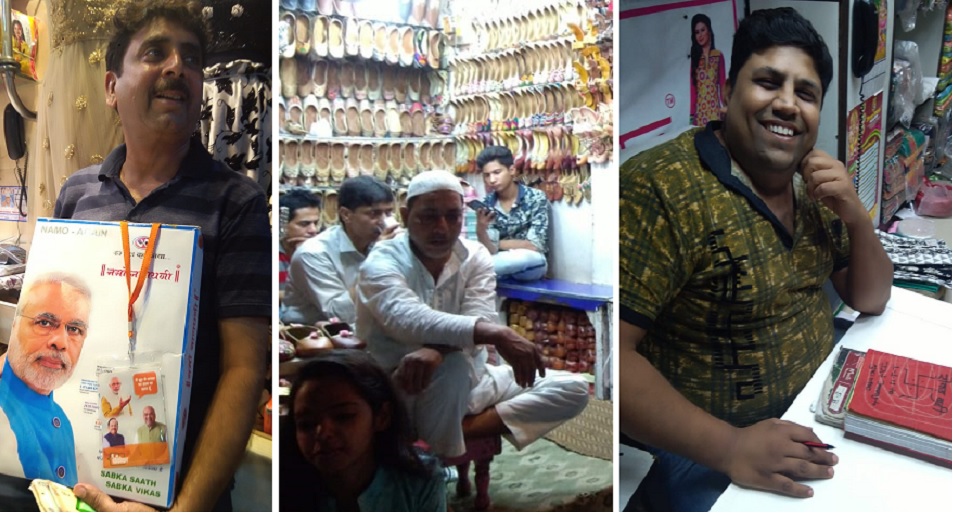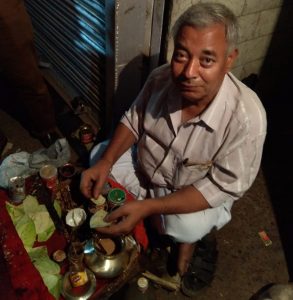In Delhi, traders united over 'Gabbar Singh Tax' but divided over Modi

Amid the maddening crowd negotiating the congested lanes of Delhi’s Chandni Chowk — the nerve centre of trade — one can taste the dirt and disillusionment of voters between the teeth. But they all go about their work as usual.
“Life moves on no matter which party or government comes to power. For us, everything in life is a trade-off — you have to decide how to clinch the best deal,” says Jatin Sindhwani, a wholesale garment trader at Kucha Natwa market. The 32-year-old trader seems visibly happy with his philosophical take on the dip in business following glitches in implementation of the Goods and Services Tax (GST) in July 2017 and cash crunch faced due to demonetisation a few months before.
But elections, Sindhwani insists, is not about business. “It’s about the country’s future. And country needs Modiji (Narendra Modi).”
Sixty-seven-year-old Bharat Malik joins in from three shops away. “Our votes will go only to Modiji. Who else is there to lead the country? Only Modi could show Pakistan its place,” says Malik. He claims he has never heard Modi bragging about Balakot and soldiers or asking votes in anyone else’s name. “Woh bas kaam karte hai. Unka apna koi swarth nahin hai, naa hi parivar (He works tirelessly and selflessly. He has no children to leave his wealth to).”
Gabbar Singh Tax
When mentioned that even Rahul Gandhi has no children and is not married, Sindhwani breaks out in laughter.
He, however, agrees with Gandhi on one thing — Gabbar Singh Tax. “Our losses have increased. Paperwork has increased. Now every month we end up spending around Rs 10,000 on personal accountants to file GST. More than looking after our shops we have to run after accountants. We wanted some changes and concessions to the GST, but the government didn’t listen to us.”
Amid the hyperbole about ‘love for India’, no one is interested in talking about Union minister Harsh Vardhan, who is seeking a re-election from Chandhi Chowk seat. He is up against two-time Congress MP JP Agarwal and Pankaj Gupta of the Aam Aadmi Party.
“Harsh Vardhan kaun hai, usko koi nahin poochta (No one cares about Harshvardhan. When we [traders] needed someone to listen to us, there was no one,” Sindhwani nods his head dismissively.

So, the traders are unhappy with the BJP?
“No, no,” Sidhwani goes on to explain. “The angst against the government because of GST and demonetisation is gradually dissipating.” Ask him why? “We have to look beyond our personal losses and think about the greater good of the country. No other PM but Modiji had the courage to take on Pakistan. Have you not seen what we did in Balakot, how he [Modiji] got our pilot back from the jaws of death.”
Poll Pe Charcha
But the real ‘poll pe charcha’ takes place at Janak store, where owner Jawahar Thakkar leads a small group of fellow traders, busy discussing the Lok Sabha elections with both the BJP and the Congress announcing its candidates for the May 12 polls in Delhi.
Thakkar proudly announces that even hard-core supporters of the Aam Aadmi Party and the Congress are going with Modiji this time. “He was an AAP supporter but ask him who is he supporting this time,” Thakkar points at a trader whose shop is right in front of Janak store. The man gives a wry smile. “This time I’m going with whatever bhaisahab [Thakkar] says.” But his co-worker butts in with a straight face. “We will see on the day of polling,” the man refuses to give away his name or allegiance to any political party. Thakkar pacifies everybody and announces, “Traders in Chandhi Chowk are not divided. We don’t do Hindu-Muslim politics but we will go with one party.”
“It’s not about hatred for any other leader… baat aadarsh ki hai (It’s about ideology),” says Thakkar sitting next to a saree box emblazoned with a ‘Namo Again’ logo. He says it was a gift from a saree manufacturer from Surat which goes by the name “Namo Narayani”. He then happily poses for The Federal with the saree box and his “Mai bhi Chowkidar” card, which he says was distributed at a recent event.
A road and a deep chasm
A little away from Kucha Natwa and opposite the town hall is Ballimaran market, famous for vintage eyeglasses and latest footwear. The chasm between the two sides of the road is clearly accentuated by the poll rhetoric and the ongoing Chandni Chowk redevelopment project. Not even the dust cloud rising off the dug-up road can hide the polarisation between the two sides.
At Ballimaran, Noor Mohammad has a completely different tale to tell. “Our votes will go to the Congress. This Hindu-Muslim politics is eating away at the nation’s foundations. This is not good for our children,” he says.
More than the dip in business and the ‘nightmare’ of GST, Noor Mohammad seems worried about the lack of good education for children. “Only education can improve the mindset of youngsters who blindly follow divisive political figures. The Modi government talked so much about Sabka Saath Sabka Vikas (development for all). Where is vikas? Where is saath (unity)?”
And what about AAP?
Noor Mohammad dismisses the suggestion with a wave of his hand. “Aam Aadmi party RSS ki party hai. Koi bharosa nahin unka (One can’t trust the AAP, it’s team-B of RSS). It will only cut votes.”
This election, Mohammad says, GST is definitely the biggest issue among the traders, but somehow the Hindu traders are now ready to overlook personal losses and are chanting ‘Modi, Modi’.
“All this is momentary. They are worried that the BJP government will come back to power. That’s why doing Modi, Modi. Once there are enough indications that the BJP can be defeated in the elections, traders will start singing a different song. Akhir vyapari kisi ka saga kyu hone laga (Nothing but good business can buy traders’ support),” says Nasim Ahmed, another wholesale trader of footwear. “We all were angry with the government.”
In Chandhi Chowk, it is business that matters, not the trader’s religion, says Ahmed. He, however, agrees with Mohammad that the atmosphere has been completely vitiated by BJP’s Hindu-Muslim politics in the past five years.
Another small-time trader from the next shop slowly joins the conversation with an important point. “With elections drawing closer, the views among traders are also changing. After the Talkatora stadium conclave, the big traders have managed to convince the small and medium traders about the importance of bringing back Modi,” he says referring to the recent national conclave of the Confederation of All India Traders (CAIT) addressed by Modi.
Following the April 19 conclave, the CAIT on April 21 has declared that seven crore traders would vote for the BJP and will also exhort their customers to do the same. The CAIT is the apex body of business community representing seven crore traders through more than 40,000 trade associations and federations across the country.
Chowkidar in the chowk
Its national secretary general Praveen Khandelwal, who uses ‘Chowkidar’ as a prefix in his Twitter account, insists that “the trading community will be a priority for Modi when he forms the next government’’. A week before that CAIT reportedly pressed upon the BJP’s senior leadership to field Khandelwal from Chandni Chowk to give due representation to the trading community. Apart from GST, the community was hit by the sealing drive (started on the Supreme Court-appointed panel’s orders in December 2017) with nearly 6,000 commercial units shuttered.
However, following the naming of Harsh Vardhan as BJP’s Chandni Chowk candidate, the right-leaning traders’ association and Khandewal wished him luck and pledged their support.
“There is a lot that takes place behind the scene. Small traders like us are not necessarily part of the bigger game plan,” says Naim Rehman, who hinted at going with the popular wave.
Such claims about ‘popular wave’, however, take a 360-degree turn the moment you enter a small cosmetics shop at the mouth of the lane that leads to Ballimaran.
Twenty two-year-old Vaishali and her older cousin Shivani, who run the shop, seem least bothered about the elections. Ask them who are the candidates from Chandni Chowk and they both say, “Sorry, can’t say for sure… Anyway, what’s the point?.”
The first-generation working women from their family, both are more troubled with the dug-up road and dust and grime from it settling on their beauty products.
A little ahead of their shop, first-time voter Afrida too seems equally disinterested. Afrida is in-charge of billing at a garment boutique. “I don’t think I want to vote for any candidate. Let’s see, may be NOTA. The one who has to win will win anyway,” says the 21-year-old.
Disgruntled voters and a ‘fake govt’
The indifference among the younger generation to participate in the ‘festival of democracy’ grows louder at Krishna market on the main road. Twenty-seven-year-old Kiranjot is a soft-spoken but angry man. “What is there to talk about elections? We don’t vote,” he says, but opens up after a little prodding. “Our business is very down. GST has killed everything. Customers end up paying more in roadside shops than big showrooms because of such high GST. So why would they come to our shop,” says Kiranjot, who runs a garment shop.”
He then goes on, “To tell you the truth, I voted for the BJP last time but this time I’ll not vote for anyone. We will never vote for the Congress. So, it’s better to abstain or press NOTA. Main batao, asal mein yeh fake government hain (This is a government that makes fake promises).”
At Khari Baoli Road, spice trader Rupesh Aggrawal and dry fruit seller Ankit Madan are more forthcoming about their angst over the GST. “Sources of income have dried up and that is why the markets look empty. There is no money, liquid money,” says Madan.
Both Aggarwal and Madan complain of loss of business and the headache of filing GST every month. “Tax is not a problem but the complex system that we have to follow and run after accountants. Most small-time traders are illiterate and don’t even know the various tax slabs,” Aggarwal reasons, adding that no government or politician cares for public nor are elections based on issues.
“Voters go with the wave created by the middlemen. One big trader is enough to decide which way the wind will blow. The smaller ones follow him,” smiles Madan.
Noor Mohammad concurs that at the end of the day one man can change the whole game. “Sab apni, apni rotiya sekte hain (Everyone is busy reaping political benefits).”
